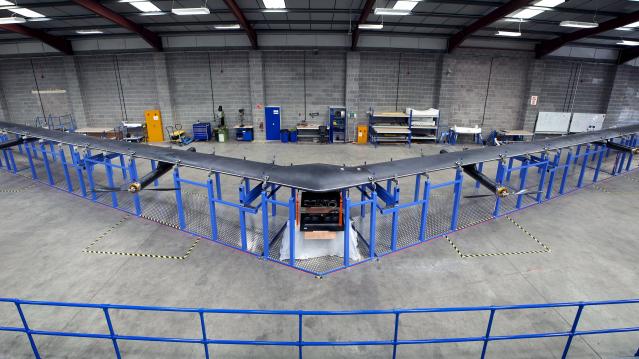Facebook Is Testing a Solar-Powered Internet-Beaming Drone

Imagine looking up at the sky and seeing a 900 lb. drone the size of Boeing 737 moving in slow circles 11 miles above you. As part of Facebook’s plan to provide Internet access to the 4 billion people who currently lack it, that could soon be the reality for the 10 percent of Earth’s population that lives far from cell towers or fiber optic lines.
Researchers at Facebook’s Connectivity Lab, a division of Facebook’s Internet.org, announced yesterday that the first such drone has been completed as a step toward building a larger fleet. The craft hasn’t been flown yet, but Facebook has been testing versions one-tenth the size over the U.K. and plans on beginning flight tests of the full-size craft before the end of this year.
Related: 12 Weird Uses for Drones
The drone, termed Aquila (Latin for “Eagle), is a solar-powered V-shaped carbon fiber craft that will carry equipment such as solar panels and communications gear that can beam down wireless Internet connectivity. Lacking wheels or the ability to climb, the drone will be launched using helium balloons and will be able to fly for 90 days at a time.
One of the biggest breakthroughs in the project has been the team developing a way to increase the data capacity of the lasers involved. The new system allows a ground-based laser to transmit information to a dome on the underside of the plane at 10 GB per second, about 10 times faster than previously thought possible.
Facebook’s mission isn’t without controversy. Worldwide, critics have been questioning many of Internet.org’s practices on privacy, fairness and security grounds. Those opponents fear that users of Internet.org might be monitored through state-run telecoms, in some cases allowing countries to spy on and repress their citizens. In addition, first-time users of the Internet might confuse Facebook for the entire Internet and only receive news and information from the one site.
The flack Internet.org is receiving isn’t the only problem Facebook has to deal with. Rival Google also has a project in the works to bring wireless Internet to rural communities. Their program, called “Project Loon,” involves high-altitude helium balloons that have transmitters attached to them. Although the project hasn’t been launched yet, it’s in more advanced stages than Aquila.
Watch the video from Facebook’s Connectivity Lab:
Will Trump's Tax Cuts Really Happen? Economists Are Surprisingly Optimistic
Despite all the thorny questions swirling around President Trump's nascent tax reform plan, 29 of 38 economists surveyed by Bloomberg in a monthly poll said they expect Congress to cut taxes by November of next year.
The hitch: The economists don’t expect the cuts will help the economy much. The median projection of a larger group of 71 economists is for 2018 growth of 2.3 percent, up only slightly from 2.1 percent this year — and by 2019, the economists see growth slipping back to 2 percent.



